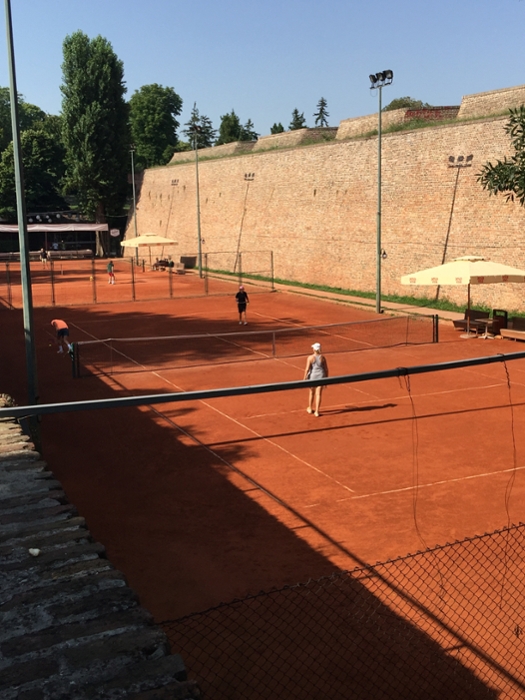Belgrade
I woke up at 3:30 the morning after my last day at D4D to finish packing and cleaning the apartment. I forgot that the water is turned off every night between midnight and 6 AM. Luckily I had a couple of bottles of drinking water that I used to clean countertops and lightly shower myself. I took a six o'clock bus from Pristina and arrived in Skopje, Macedonia at 8 AM. In Skopje I waited for an hour before boarding a Belgrade-bound bus.
Entering Serbia from Kosovo is tricky. Serbia still claims Kosovo as a part of Serbia. Those who attempt to travel directly from Kosovo into Serbia who do not have a Serbian stamp in their passports may be turned away by Serbian border patrol for entering the country illegally. Throughout my stay in Kosovo I asked people whether or not I would be able to cross the Serb-Kosovo border, receiving a variety of answers. I asked the Swedish embassy in Kosovo, but still did not get a clear answer. I decided to travel around Kosovo rather than risking being stopped at the border and stranded without a car/bus. Just to be safe, I presented my European passport when entering Serbia, rather than my Kosovo-stamped US passport. I arrived in Belgrade twelve hours after leaving Pristina. A direct bus ride from Pristina to Belgrade takes half that time.
I came across an unfamiliar sight as I dragged my aging, broken suitcase up the hill to the hostel. Behind the train station is a square park, about the size of a city block. The park was filled with people. There were circles of seated people playing cards, and a game of cricket going on in the middle of the park. But most people were sitting or lying in the shade, on tarps, mats, or blankets. There were babies running around in diapers, and two women in white coats were making their way through the square with carts of medical supplies. I guessed that these were all refugees, though my hypothesis was never confirmed.
I will admit that I came to the Balkans with pro-Kosovo, anti-Novak Djokovic sentiments. These preferences deepened during my first few weeks in the region, especially after Novak won the French Open. The D4D articles I read on talks between Kosovo and Serbia painted Serbia as an antagonist refusing to recognize Kosovo's independence. Some of the papers seemed a bit biased against Serbia. Such a bias is to be expected, and perhaps excused, after the treatment of the Albanians at the hands of Serbians.
I came to Belgrade for two reasons. Firstly, it was much cheaper to fly out of Belgrade than Pristina. Secondly, I wanted to visit Serbia's national museum in Belgrade. I was interested in seeing a history of the region from the point of view of Serbia. According to Google, the museum would be open on the Saturday I was in Belgrade. I passed the entrance of the museum several times that day, but it was never open. Despite only spending twenty-four hours in the city, I enjoyed it. It is a beautiful city, in some parts resembling northern Europe. However, it is probably unfair to compare Belgrade with Pristina, as the latter received little investment or infrastructure while under Serb and Yugoslav rule.
I found a large park near my hostel, built around an old fortress. In the park I came across two of the more picturesque tennis courts I have seen, bordered on one side by a fortress wall. Vendors on the main park thoroughfare sold t-shirts depicting Djokovic or Putin. I fould one particular shirt that portrayed Putin as Van Helsing the vampire hunter, and Obama as a vampire. I also noticed, in the park and elsewhere in Belgrade, a much larger number of pet dogs (as opposed to strays) than in Pristina. I am sure there is a study somewhere that has drawn a correlation between the wealth of a city, and the number of pets owned my its residents. This might be an interesting study to read.

In the opposite direction from my hostel I found Serbia's parliament building. The poster running the length of the front sidewalk displays pictures of Serbians killed during the Kosovo War. In English, the poster declares "Families of murder victims want justice!!!"
I flew from Belgrade Saturday evening, and, after a twelve hour layover in Dusseldorf, arrived in Copenhagen Sunday morning. Copenhagen is perhaps my favorite city in the world, and I was curious to see what differences I noticed between the Danish capital and the cities I visited this summer. Stopping in Belgrade en route to Denmark may have dulled the effect, as I found Belgrade to be more developed than I expected. But I did notice a few differences between Pristina and Copenhagen. Copenhagen has many bikers, more than most cities perhaps. But I saw very few bikes while in Pristina. It was also easier to make my way through Copenhagen on foot, compared with Pristina, where cars are generally parked on sidewalks and pedestrians forced to walk in the street. It was also convenient to be in a country where most establishments accept credit cards, whereas in Kosovo I had to carry cash at all times.
I am writing this final blog post at my grandmother's house in Sweden. I will spend two weeks here before returning to the US. Apart from a desire to witness the development of a new political system in Kosovo, I also wanted to be placed at an internship where I would be able to easily visit my family in Sweden. I am grateful to the Center for Comparative Legal Studies and Post-Conflict Peacebuilding for the opportunity to do both.